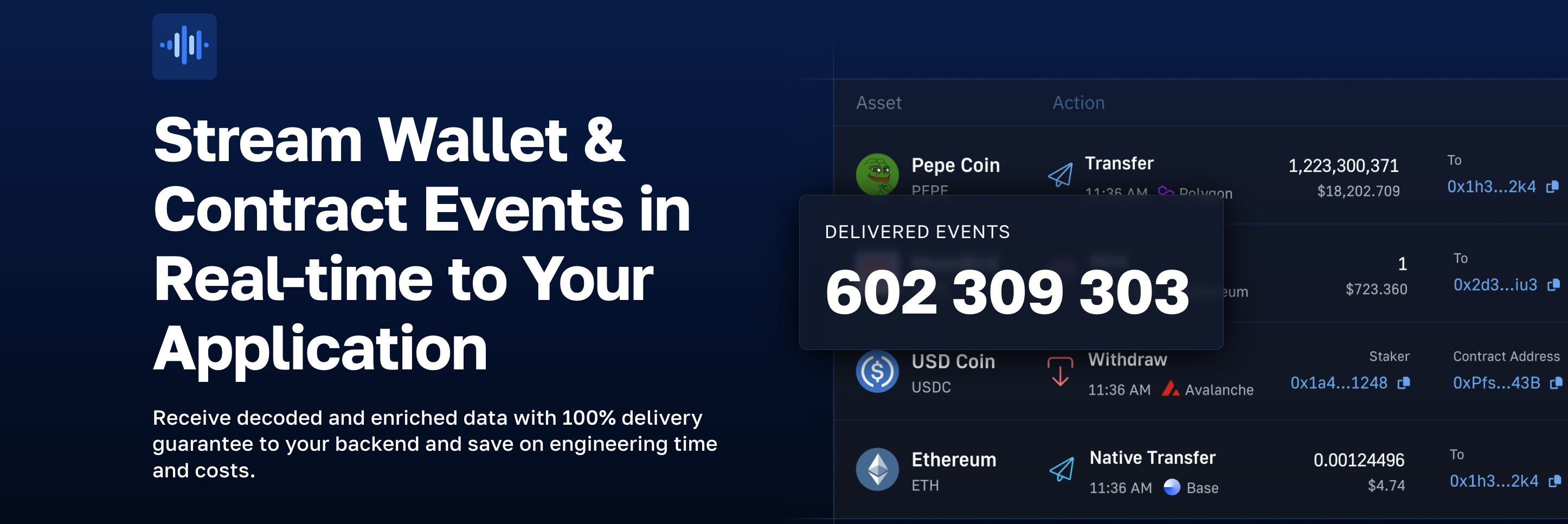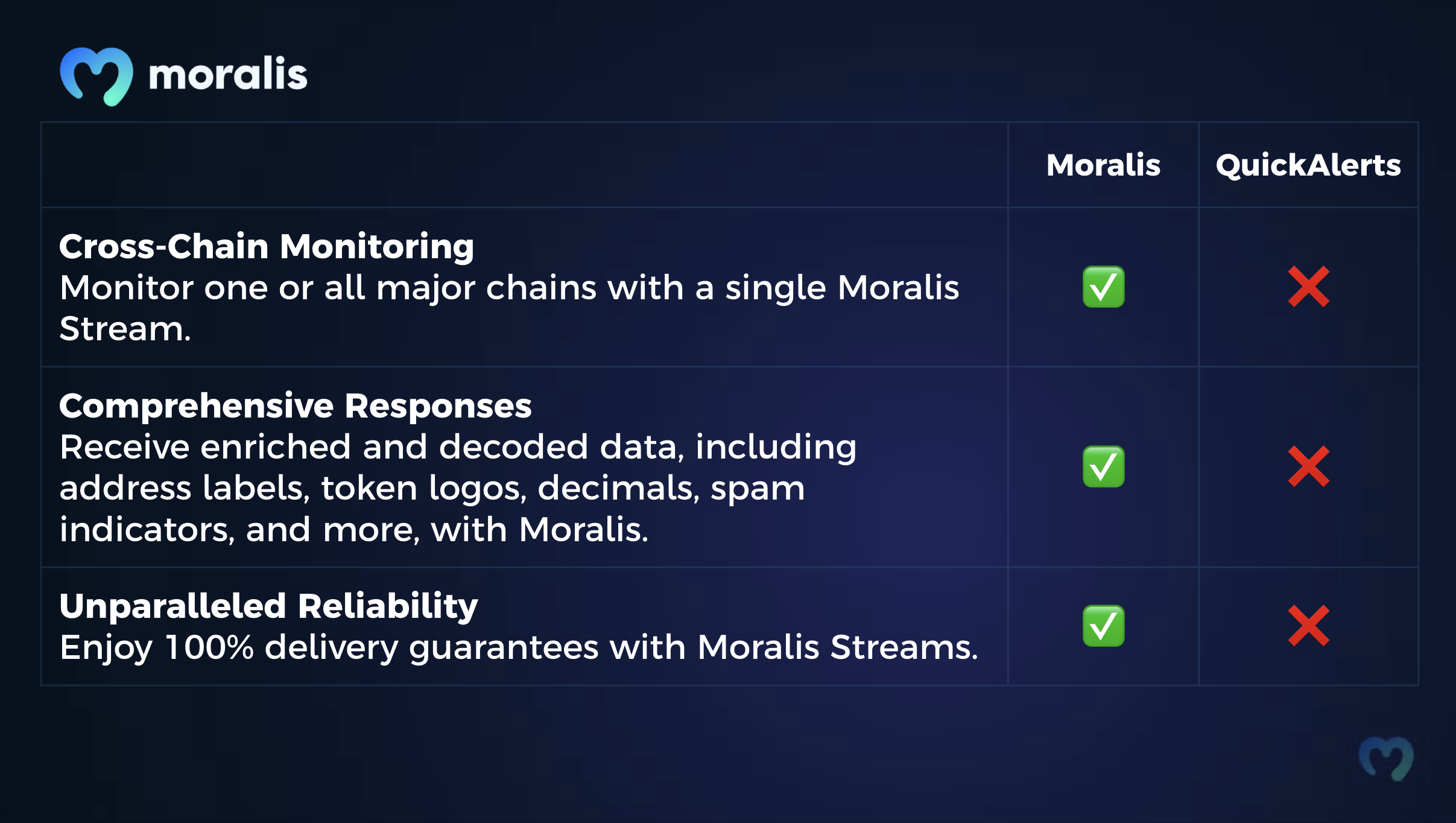Are you looking for a superior alternative to QuickAlerts? Look no further! Moralis’ Streams API is here to revolutionize the way you set up Web3 data pipelines. In this comprehensive guide, we will delve into the benefits of the Streams API and compare it to QuickAlerts, showcasing why Moralis is the top choice for real-time Web3 data solutions. If you’re eager to learn more, check out the comparison chart below:
For an in-depth analysis of the chart, continue reading as we dissect the details for you!
If you’re ready to start utilizing Moralis’ Streams API, sign up with Moralis today and unlock instant access to our powerful nodes and comprehensive API suite!
Overview
QuickNode’s QuickAlerts is a real-time Web3 data solution designed for setting up alerts. While it offers a solid service, it comes with some significant limitations. Firstly, QuickAlerts restricts you to monitoring just one blockchain when setting up alerts. Additionally, it lacks a native recovery mechanism, meaning that any downtime experienced by your decentralized application (dapp) requires manual recovery of lost events. Fortunately, there are several alternatives to QuickAlerts, with Moralis’ Streams API leading the pack.

Moralis’ Streams API streamlines the process of setting up Web3 data pipelines with just a few clicks. But what sets the Streams API apart and makes it the ideal alternative to QuickAlerts? Join us in this guide as we unravel the intricacies of the Streams API. Let’s get started!
What is QuickAlerts?
QuickAlerts is QuickNode’s alert service designed for monitoring on-chain data changes. Developers can create custom expressions to target specific blockchain data and events, which triggers real-time notifications with payloads sent to a designated webhook destination. With QuickAlerts, monitoring DeFi activities, smart contract interactions, NFT events, and more is made possible.

What can you track with QuickAlerts?
- NFTs: Set up notifications for NFT events such as transfers, mints, etc.
- Tokens: Stay informed about changes to tokens, liquidity pools, and more.
- Wallets: Monitor transactions to and from specific wallet addresses.
- Smart Contracts: Set up alerts for smart contract activities including transfers, deployments, and other updates.
Now that you have an understanding of QuickAlerts, let’s explore some of the limitations of the service.
The Limitations of QuickAlerts
While QuickAlerts provides a solid solution for streaming on-chain data in real-time, it comes with significant limitations that make it less than ideal. Here are the three main drawbacks of QuickAlerts:
- Single Chain Monitoring: QuickAlerts limits you to monitoring one blockchain per alert, requiring separate alerts for each chain, which can be time-consuming and resource-intensive.
- No Recovery Mechanisms: QuickAlerts lacks mechanisms for seamlessly recovering undelivered events, making it challenging and time-consuming to retrieve missed data in case of downtime.
- Limited Data Payloads: QuickAlerts offers data payloads with basic information, lacking in-depth details such as logos, decimals, and other valuable data when monitoring tokens.
Given these limitations, allow us to introduce Moralis’ Streams API – the ultimate tool for setting up Web3 data pipelines to stream real-time data!
The #1 QuickAlerts Alternative – Introducing Moralis’ Streams API
Moralis’ Streams API is the premier real-time Web3 data solution, offering unmatched ease of use and functionality. With its intuitive interface, you can effortlessly establish Web3 data pipelines with just a few clicks, receiving updates on wallet or contract events instantly as they happen!

The Streams API offers exceptional scalability, providing the most comprehensive real-time Web3 data service in the industry, covering all major networks such as Ethereum, Polygon, BNB Smart Chain (BSC), Optimism, and more.
Furthermore, the Streams API allows you to configure streams for a variety of events, tokens, wallets, and smart contracts, ensuring flexibility to cater to various use cases. This ensures you have all the real-time on-chain data you need at your fingertips, regardless of the platform you are building.
Now that you have a glimpse of Moralis Streams, let’s explore the key benefits of our cutting-edge service!
Benefits of Moralis Streams
Why is Moralis the superior alternative to QuickAlerts? Let’s delve into the main benefits of Moralis Streams:
- Comprehensive Chain Support: Moralis Streams supports over 30 blockchain networks, enabling effortless setup of data pipelines for all major chains.
- Cross-Chain Monitoring: Monitor multiple chains within a single stream with Moralis, eliminating the need for separate data pipelines for each network you interact with.
- Guaranteed Delivery: Moralis ensures secure backup and full replayability of payloads in the event of downtime, guaranteeing 100% delivery.
- Fully Enriched & Decoded Data: Moralis Streams offers the most comprehensive data responses in the industry, including token logos, decimals, address labels, balance details, spam indicators, and more.
- Unparalleled Scalability: Moralis Streams are designed for scalability, allowing you to manage from one to over 100 million addresses in a single stream without performance degradation.
These features highlight the superiority of Moralis Streams. Now, let’s compare our service to QuickAlerts to showcase the primary differences!
Full Comparison: Moralis Streams Vs. QuickAlerts
Here’s a chart highlighting the main differences between Moralis Streams and QuickAlerts:

Let’s dive deeper into the chart:
- Cross-Chain Monitoring: Moralis allows efficient monitoring of multiple chains through a single stream, simplifying the workflow. In contrast, QuickAlerts requires configuration of a new alert for each chain, which can be time-consuming.
- Most Comprehensive Responses: Moralis Streams API offers the most comprehensive responses in the industry, providing enriched payloads with detailed data. For instance, Moralis Streams provides significantly more information when monitoring USDC events compared to QuickAlerts.
- Unparalleled Reliability: Moralis Streams includes a robust native recovery mechanism for undelivered events, ensuring 100% delivery reliability. Undelivered events are easily accessible under the “Logs” tab for replay.
In conclusion, Moralis Streams presents a superior solution compared to QuickAlerts in terms of cross-chain monitoring, response comprehensiveness, and reliability!
Tutorial: How to Set Up Web3 Data Pipelines with Moralis
With Moralis’ Streams API, setting up custom Web3 data pipelines is a breeze. Here’s a step-by-step guide to monitoring USDC transactions in eight simple steps:
- Create a Moralis account, log in, click the “Streams” tab, and hit “+ Create Stream”.
- Give your stream a name and select the type of events you wish to monitor, such as “Contract Events”.
- Choose the events you want to track, like “Common Events” and then “Token Transfers”.
- Provide a tag for your stream and select additional information to add to your data payloads.
- Add the contract address(es) you want to monitor, such as the USDC address.
- Select the chain(s) you want to track, for example, Ethereum.
- Test your stream.
- Add your webhook URL, click “Continue,” and hit “Save & Deploy”.
Now you’ll receive real-time updates when USDC transfers occur. Here’s an example of what the responses will look like:
{
transactionHash: '0x3858c26ad521b041e0550c90bfd39149131eca657de0a48361b5b7f3f0a6e23f',
logIndex: '395',
contract: '0xa0b86991c6218b36c1d19d4a2e9eb0ce3606eb48',
triggered_by: [Array],
from: '0x3fc91a3afd70395cd496c647d5a6cc9d4b2b7fad',
to: '0x88e6a0c2ddd26feeb64f039a2c41296fcb3f5640',
value: '2361961560',
tokenName: 'USD Coin',
tokenSymbol: 'USDC',
tokenDecimals: '6',
logo: 'https://logo.moralis.io/0x1_0xa0b86991c6218b36c1d19d4a2e9eb0ce3606eb48_e6ec22e3ef954a7f9eda04f294938f4d',
thumbnail: 'https://logo.moralis.io/0x1_0xa0b86991c6218b36c1d19d4a2e9eb0ce3606eb48_e6ec22e3ef954a7f9eda04f294938f4d',
possibleSpam: false,
verifiedCollection: true,
valueWithDecimals: '2361.96156'
}
That’s it! You now know how to seamlessly access real-time blockchain data with Moralis Streams. You can follow the steps above to create Web3 data pipelines for other custom events!
If you’re interested in a more detailed walkthrough of the steps above and how to leverage your streams in a real-world scenario, check out the Moralis YouTube video DeFi Daily News!
Moralis Streams Use Cases
After exploring the Streams API and its usage, let’s delve into some prominent use cases for streaming real-time blockchain data:
- Tracking Wallet Addresses: Monitor millions of addresses across major chains through a single data stream, enabling features like token gating.
- Web3 Alerts: Enhance user engagement with real-time notifications based on wallet holdings, keeping users informed about token transfers, price changes, and more.
- Populating Databases: Track, index, and store real-time events in your database to maintain a comprehensive record of blockchain activities for any contract, address, or wallet.
These are just a few common use cases for the Streams API. However, the flexibility of this tool allows customization for a wider array of applications.
Beyond the Best QuickAlerts Alternative – Exploring Moralis Further
Moralis is the leading Web3 data provider in the industry. In our suite of development tools, you’ll find top-tier RPC nodes alongside many other interfaces, including the Wallet API, NFT API, Token API, and more. Whether you’re building a cryptocurrency wallet, decentralized exchange (DEX), or any other Web3 platform, Moralis has you covered for all your data needs!
 Source link
Source link 


















